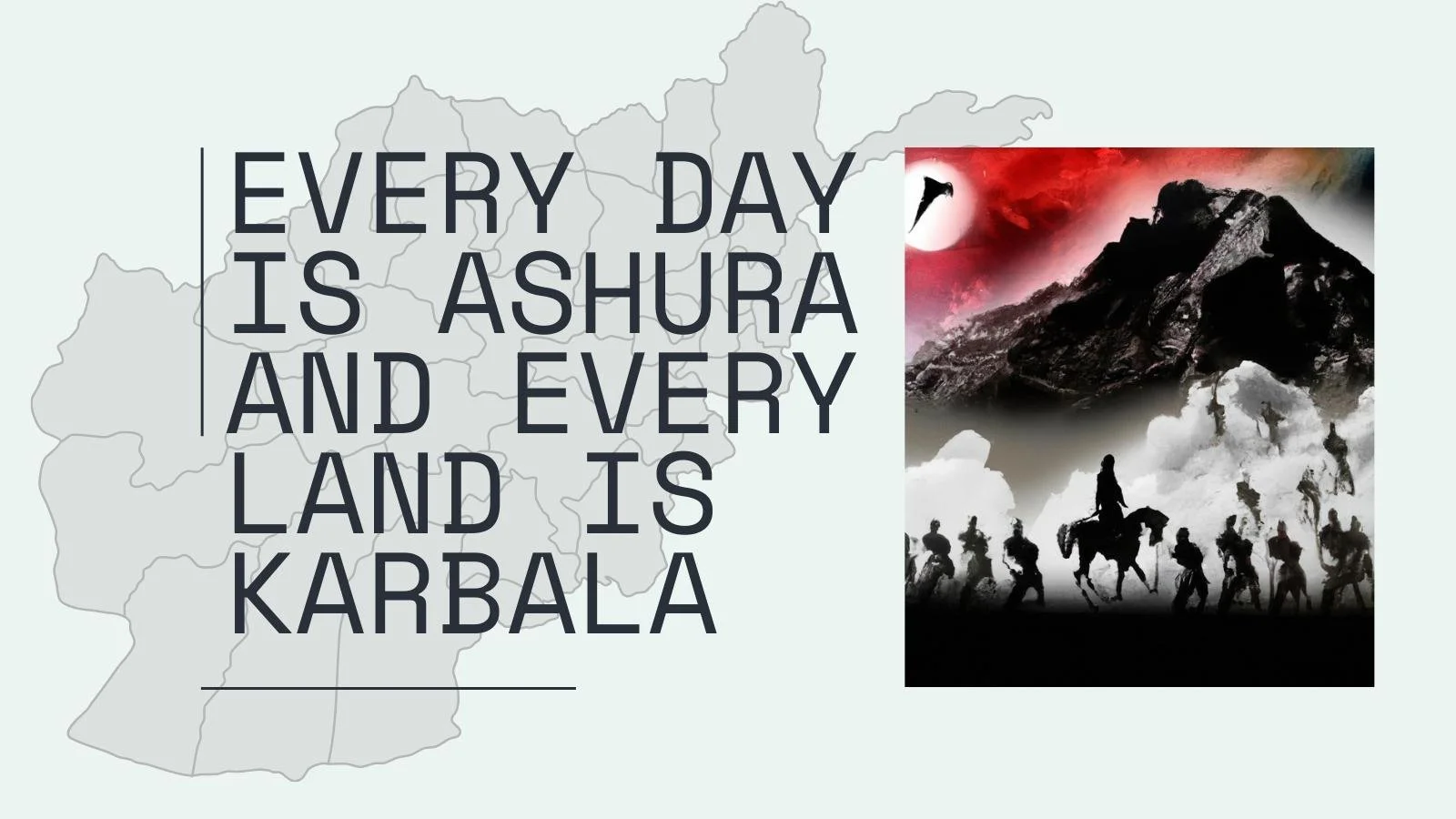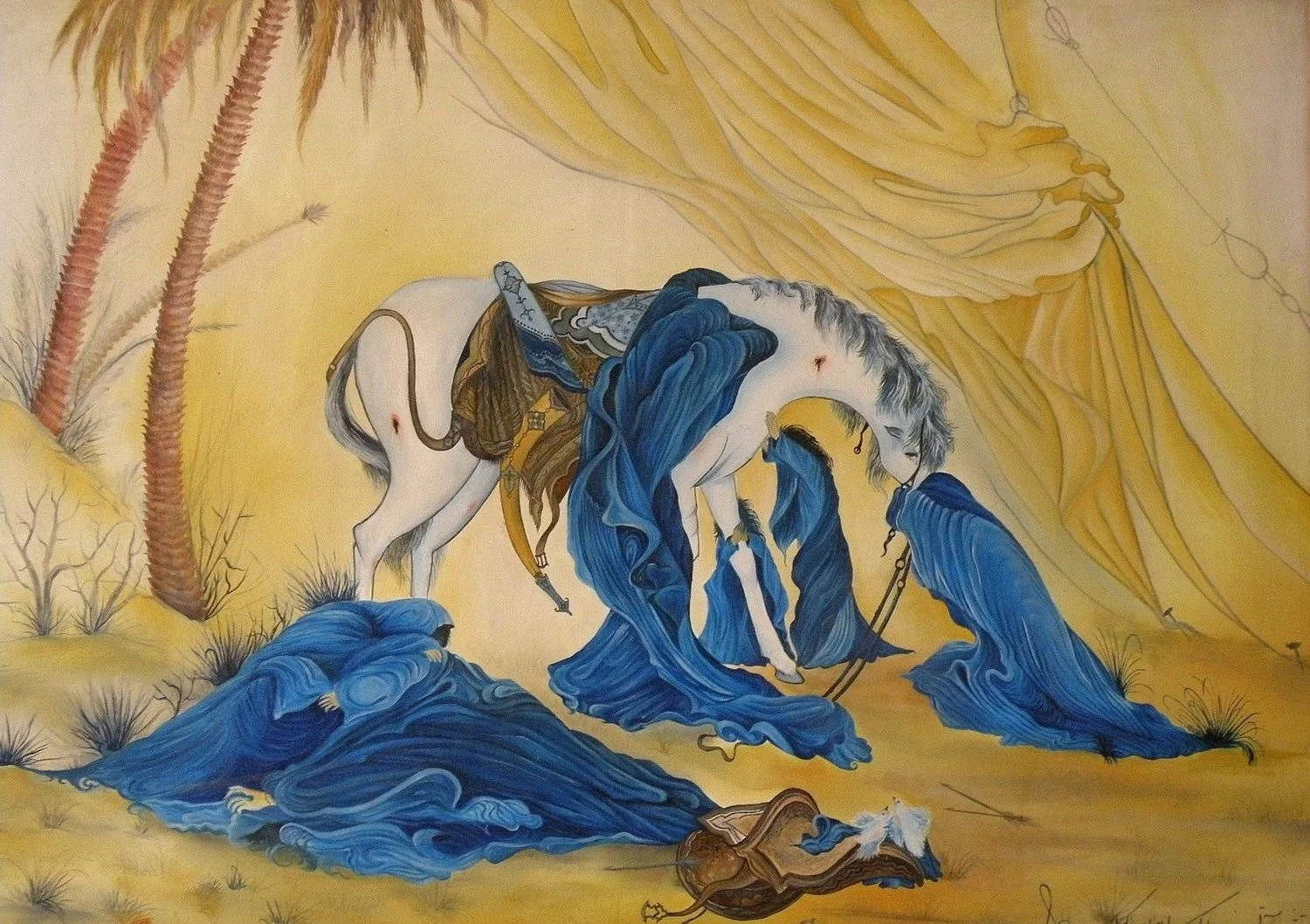Is There Anyone Who Will Come to Our Aid?
Ahmad Massoud, Red Shi’ism, and the Battle for Afghanistan’s Soul
BY KUMAYL NAZARY | July 18, 2023 | kumayl@wearenrf.org | @knazary
In the heart of the Hindu Kush mountains, under a night sky scattered with stars, a profound plea resonates across the valleys: “Is there anyone who will come to our aid?”
This cry, first voiced by Imam Hussain (pbuh) in the Battle of Karbala, can be heard amidst the current strife in Afghanistan. A narrative filled with courage, sacrifice, and active resistance against despotism, passed down through centuries, reaching us today as a timeless model for resistance against tyranny— a tangible manifestation of Dr. Ali Shariati's concept of Red Shi’ism.
Shariati’s Red Shi’ism is a dynamic call for action against tyranny, a light that guides the oppressed towards resistance. It is distinct from what Shariati calls Black Shi’ism, which is more inclined towards quietude, retreating into perpetual mourning, and ritualistic lamentation. While both Red and Black Shi'ism mourn the tragedy of Karbala, Red Shi’ism channels the emotion into fuel for resistance and the pursuit of justice, reflecting Imam Hussain's active stand against oppression.
Black Shi’ism, as characterized by Shariati, encompasses the aspect of Shi’ism which emphasizes mourning and lamentation. It is a Shi’ism steeped in sorrow, remembering the tragedies that befell the House of Prophet Muhammad (pbuh) without necessarily translating this sorrow into action against present injustices. This type of commemoration is not only void of critical thinking but also risks becoming a passive observance of ritual, devoid of the activism and resistance that defined Imam Hussain (pbuh).
Imam Hussain's plea is a timless one: “Is there anyone who will come to our aid?” His call invites us to step beyond only the sorrow and rise in the active spirit of resistance against injustice.
Red Shi'ism draws on the grief of Karbala, transforming it into a flame of resistance against the oppression of any time or place. It is an active, living interpretation of Imam Hussain’s struggle, embodied in the fight against all forms of tyranny.
Over thirteen centuries ago, Imam Hussain, the Prophet Muhammad's (pbuh) grandson, confronted the despotic Umayyad Caliph Yazid, refusing to pledge allegiance. This precipitated the Battle of Karbala in 680 AD, where Hussain's (pbuh) martyrdom has since become an enduring emblem of staunch resilience in the face of tyranny.
“Evening of Ashura” by Mahmud Farshchian.
Fast forward to contemporary Afghanistan, and we find an emulation of this same struggle in Ahmad Massoud, son of the revered “Lion of Panjshir,” Ahmad Shah Massoud. Today, as the National Resistance Front of Afghanistan combats the oppressive Taliban regime, the essence of Imam Hussain's resistance at Karbala becomes more relevant than ever. Their fight is not merely against an extremist terrorist group but a struggle for the preservation of the true traditions and essence of Islam, advocating for universal values such as self-determination, democracy, and freedom.
Ahmad Massoud’s struggle mirrors that of Imam Hussain (pbuh) against Yazid, the corrupt narcissist known for his ruthless rule who demanded Hussain's allegiance to lend legitimacy to his regime.
Hussain (pbuh) refused, knowing that allegiance to such a man would mark a point of no return for his society. In a powerful sermon, Imam Hussain (pbuh) declared:
“I did not rise up for the cause of wickedness, amusement, corruption or oppression, but I rose up to reform the nation of my grandfather.”
Today, the Taliban have demanded the same from Ahmad Massoud: surrender and pledge allegiance, to lend credibility to their despotic gender-apartheid regime. Despite the insistence of regional and global powers, and numerous negotiation attempts, Massoud has refused to surrender, drawing inspiration from Imam Hussain (pbuh).
The narratives of Hussain (pbuh) and Massoud intertwine in their fight against tyranny. Both stand steadfast in their mission to uphold the core values of Islam and protect their society from a descent into despotism.
As we approach Muharram, we remember the sacrifices made at Karbala, mourning for Imam Hussain (pbuh), and reflecting on the essence of resisting against tyranny and oppression. The Muslims of Afghanistan who partake in commemorating Imam Hussain’s martyrdom in Afghanistan should not only be mourners but inheritors of this spirit, as we are called to resist oppression and injustice.
In the face of the Taliban's oppressive regime, the spirit of Red Shi’ism inspires unity, calling for resistance and courage in the face of adversity.
As the cries of the children of Karbala reverberate throughout Afghanistan, they serve not only as a reminder of a tragic past but more importantly, as a call to action. The real essence of Muharram transcends mourning—it’s about rising, resisting, emulating a timeless cry for justice, inspiring hope for a future free from tyranny.
As we remember the age-old call from Hussain, “Is there anyone who will come to my aid?” We recognize that this plea resonates just as strongly today in Afghanistan. Ahmad Massoud, the NRF, and those willing to stand against oppression are the contemporary responders to this timeless call.
Every tear shed this Muharram should not merely signify mourning but a recommitment to the values that Imam Hussain (pbuh) fought for, and the NRF is fighting for today: justice, freedom, faith, and dignity.
As we find ourselves on the threshold of Muharram, we are poised on the brink of choice. Will we merely stand as bystanders, or will we find within ourselves the resolve to rise, as Imam Hussain (pbuh) did, against tyranny and injustice?
Never to Humiliation! (هَیْهَاتَ مِنَّا الذِّلَّة) , Massoud, too, has pledged.
Let us also remember, the saga of Karbala teaches that it's never too late to join the righteous path through stories like that of Hurr ar-Riyahi.
Muharram is not just about mourning, but about rising, resisting, and living up to the timeless cry for justice.
Again, we hear the call that has been carried through the ages, now resounding in the Hindu Kush:
“Is there anyone who will come to our aid?”
With all due humility and in the comfort of my home far from the pain of my brethren, I find myself compelled to pose a question to my cherished Shia compatriots this Muharram:
Will we merely lament in our sorrow as Yazid's forces gear up to assault our places of worship again, or shall we answer Massoud’s enduring plea?
In the shadow of our shared grief and reverence for the Master of Martyrs, our dear Imam Hussain (as), let us ponder deeply on our role in this historical continuum.


